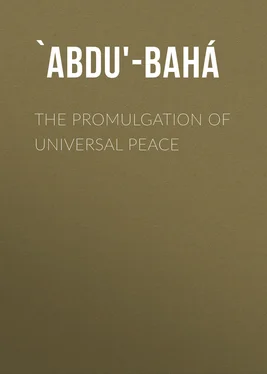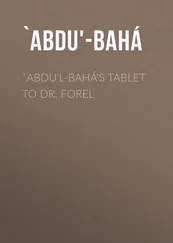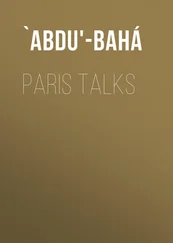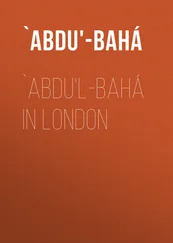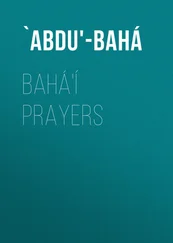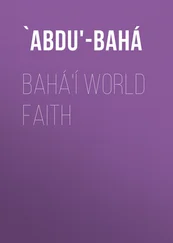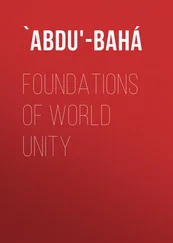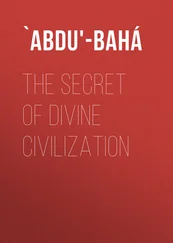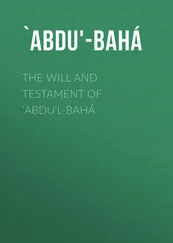`Abdu'-Bahá - The Promulgation of Universal Peace
Здесь есть возможность читать онлайн «`Abdu'-Bahá - The Promulgation of Universal Peace» — ознакомительный отрывок электронной книги совершенно бесплатно, а после прочтения отрывка купить полную версию. В некоторых случаях можно слушать аудио, скачать через торрент в формате fb2 и присутствует краткое содержание. Издательство: Иностранный паблик, Жанр: foreign_prose, foreign_religion, Философия, Ужасы и Мистика, foreign_psychology, на английском языке. Описание произведения, (предисловие) а так же отзывы посетителей доступны на портале библиотеки ЛибКат.
- Название:The Promulgation of Universal Peace
- Автор:
- Издательство:Иностранный паблик
- Жанр:
- Год:неизвестен
- ISBN:нет данных
- Рейтинг книги:4 / 5. Голосов: 1
-
Избранное:Добавить в избранное
- Отзывы:
-
Ваша оценка:
- 80
- 1
- 2
- 3
- 4
- 5
The Promulgation of Universal Peace: краткое содержание, описание и аннотация
Предлагаем к чтению аннотацию, описание, краткое содержание или предисловие (зависит от того, что написал сам автор книги «The Promulgation of Universal Peace»). Если вы не нашли необходимую информацию о книге — напишите в комментариях, мы постараемся отыскать её.
The Promulgation of Universal Peace — читать онлайн ознакомительный отрывок
Ниже представлен текст книги, разбитый по страницам. Система сохранения места последней прочитанной страницы, позволяет с удобством читать онлайн бесплатно книгу «The Promulgation of Universal Peace», без необходимости каждый раз заново искать на чём Вы остановились. Поставьте закладку, и сможете в любой момент перейти на страницу, на которой закончили чтение.
Интервал:
Закладка:
These are the institutions of God and the foundations of His temple, the Ma shriqu’l-A dhkár. The outer edifice is a symbol of the inner. May the people be admonished thereby.
I pray in your behalf that your hearts may be enlightened with the light of the love of God; that your minds may develop daily; that your spirits may become aglow with the fire and illumination of His glad tidings, until these divine foundations may become established throughout the human world. The first of these institutions and foundations is the oneness of humanity and love among mankind. The second is the Most Great Peace. Praise be to God! This American democracy manifests capacity, showing forth readiness to become the standard-bearer of the Most Great Peace. May its hosts be the hosts of the oneness of humanity. May they serve the threshold of God and spread the message of the good pleasure of God.
O Thou kind Lord! This gathering is turning to Thee. These hearts are radiant with Thy love. These minds and spirits are exhilarated by the message of Thy glad tidings. O God! Let this American democracy become glorious in spiritual degrees even as it has aspired to material degrees, and render this just government victorious. Confirm this revered nation to upraise the standard of the oneness of humanity, to promulgate the Most Great Peace, to become thereby most glorious and praiseworthy among all the nations of the world. O God! This American nation is worthy of Thy favors and is deserving of Thy mercy. Make it precious and near to Thee through Thy bounty and bestowal.
30 April 1912
Talk at Hull House
Chicago, Illinois
When we view the world of creation, we find that all living things may be classified under two aspects of existence. First, they possess bodies composed of material substance common to all—whether vegetable, animal or human. This is their point of agreement or, as it is philosophically termed, their point of contact. Second, they vary and differ from each other in degree and function—that is to say, in their respective kingdoms. This is their point of distinction and differentiation. For instance, the vegetable and animal are alike in the fact that their bodies are composed of the same material elements but widely different in their kingdoms and powers. Man is like the animal in physical structure but otherwise immeasurably separated and superior.
In the human kingdom itself there are points of contact, properties common to all mankind; likewise, there are points of distinction which separate race from race, individual from individual. If the points of contact, which are the common properties of humanity, overcome the peculiar points of distinction, unity is assured. On the other hand, if the points of differentiation overcome the points of agreement, disunion and weakness result. One of the important questions which affect the unity and the solidarity of mankind is the fellowship and equality of the white and colored races. Between these two races certain points of agreement and points of distinction exist which warrant just and mutual consideration. The points of contact are many; for in the material or physical plane of being, both are constituted alike and exist under the same law of growth and bodily development. Furthermore, both live and move in the plane of the senses and are endowed with human intelligence. There are many other mutual qualifications. In this country, the United States of America, patriotism is common to both races; all have equal rights to citizenship, speak one language, receive the blessings of the same civilization, and follow the precepts of the same religion. In fact numerous points of partnership and agreement exist between the two races; whereas the one point of distinction is that of color. Shall this, the least of all distinctions, be allowed to separate you as races and individuals? In physical bodies, in the law of growth, in sense endowment, intelligence, patriotism, language, citizenship, civilization and religion you are one and the same. A single point of distinction exists—that of racial color. God is not pleased with—neither should any reasonable or intelligent man be willing to recognize—inequality in the races because of this distinction.
But there is need of a superior power to overcome human prejudices, a power which nothing in the world of mankind can withstand and which will overshadow the effect of all other forces at work in human conditions. That irresistible power is the love of God. It is my hope and prayer that it may destroy the prejudice of this one point of distinction between you and unite you all permanently under its hallowed protection. Bahá’u’lláh has proclaimed the oneness of the world of humanity. He has caused various nations and divergent creeds to unite. He has declared that difference of race and color is like the variegated beauty of flowers in a garden. If you enter a garden, you will see yellow, white, blue, red flowers in profusion and beauty—each radiant within itself and although different from the others, lending its own charm to them. Racial difference in the human kingdom is similar. If all the flowers in a garden were of the same color, the effect would be monotonous and wearying to the eye.
Therefore, Bahá’u’lláh hath said that the various races of humankind lend a composite harmony and beauty of color to the whole. Let all associate, therefore, in this great human garden even as flowers grow and blend together side by side without discord or disagreement between them.
30 April 1912
Talk at Fourth Annual Conference of the National Association for the Advancement of Colored People
Handel Hall, Chicago, Illinois
According to the words of the Old Testament God has said, “Let us make man in our image, after our likeness.” This indicates that man is of the image and likeness of God—that is to say, the perfections of God, the divine virtues, are reflected or revealed in the human reality. Just as the light and effulgence of the sun when cast upon a polished mirror are reflected fully, gloriously, so, likewise, the qualities and attributes of Divinity are radiated from the depths of a pure human heart. This is an evidence that man is the most noble of God’s creatures.
Each kingdom of creation is endowed with its necessary complement of attributes and powers. The mineral possesses inherent virtues of its own kingdom in the scale of existence. The vegetable possesses the qualities of the mineral plus an augmentative virtue, or power of growth. The animal is endowed with the virtues of both the mineral and vegetable plane plus the power of intellect. The human kingdom is replete with the perfections of all the kingdoms below it with the addition of powers peculiar to man alone. Man is, therefore, superior to all the creatures below him, the loftiest and most glorious being of creation. Man is the microcosm; and the infinite universe, the macrocosm. The mysteries of the greater world, or macrocosm, are expressed or revealed in the lesser world, the microcosm. The tree, so to speak, is the greater world, and the seed in its relation to the tree is the lesser world. But the whole of the great tree is potentially latent and hidden in the little seed. When this seed is planted and cultivated, the tree is revealed. Likewise, the greater world, the macrocosm, is latent and miniatured in the lesser world, or microcosm, of man. This constitutes the universality or perfection of virtues potential in mankind. Therefore, it is said that man has been created in the image and likeness of God.
Let us now discover more specifically how he is the image and likeness of God and what is the standard or criterion by which he can be measured and estimated. This standard can be no other than the divine virtues which are revealed in him. Therefore, every man imbued with divine qualities, who reflects heavenly moralities and perfections, who is the expression of ideal and praiseworthy attributes, is, verily, in the image and likeness of God. If a man possesses wealth, can we call him an image and likeness of God? Or is human honor and notoriety the criterion of divine nearness? Can we apply the test of racial color and say that man of a certain hue—white, black, brown, yellow, red—is the true image of his Creator? We must conclude that color is not the standard and estimate of judgment and that it is of no importance, for color is accidental in nature. The spirit and intelligence of man is essential, and that is the manifestation of divine virtues, the merciful bestowals of God, the eternal life and baptism through the Holy Spirit. Therefore, be it known that color or race is of no importance. He who is the image and likeness of God, who is the manifestation of the bestowals of God, is acceptable at the threshold of God—whether his color be white, black or brown; it matters not. Man is not man simply because of bodily attributes. The standard of divine measure and judgment is his intelligence and spirit.
Читать дальшеИнтервал:
Закладка:
Похожие книги на «The Promulgation of Universal Peace»
Представляем Вашему вниманию похожие книги на «The Promulgation of Universal Peace» списком для выбора. Мы отобрали схожую по названию и смыслу литературу в надежде предоставить читателям больше вариантов отыскать новые, интересные, ещё непрочитанные произведения.
Обсуждение, отзывы о книге «The Promulgation of Universal Peace» и просто собственные мнения читателей. Оставьте ваши комментарии, напишите, что Вы думаете о произведении, его смысле или главных героях. Укажите что конкретно понравилось, а что нет, и почему Вы так считаете.
